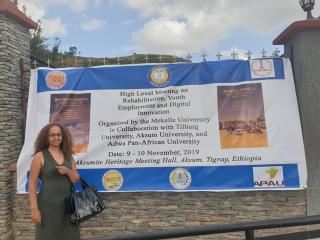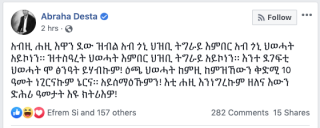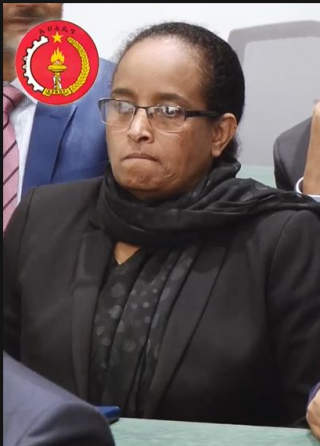
BUSINESS
Macroeconomic imbalances evolving to crises

16 November 2019
By Birhanu Fikade
https://www.thereporterethiopia.com/art ... ing-crises
The coming of Prime Minister Abiy Ahmed (PhD) to power has been marred with critical political, economic and social pitfalls. His measures in relaxing the stifling leadership style of the ruling Ethiopian Peoples’ Revolutionary Democratic Front (EPRDF) likewise stimulated many to come out and speak.

Local experts have been coming out in the open to voice their thoughts about the measures that are being taken and the economic policies of the current administration. Public discussions, meetings and lectures mostly denounced the previous administration’s ill-planned and mismanaged economy, which many assume have led to the current macroeconomic imbalances that would eventually lead the economy into crises.
Well cultivated bad performers?
Economics experts The Reporter talked to describe previous leaders as attentive learners of complex ideas of economics, specially development economics theories and policies.
Kenichi Ohno (PhD) is a renowned Japanese professor of economics. He was a longtime close advisor to the late Prime Minister Meles Zenawi and to the former Prime Minister Hailemariam Dessalegn. According to Ohno, both were observant and good learners. Both have spent hours listening to Ohno about the success stories and the developments of Southeast Asian big economies of today. They were taught about the policies and economic strategies of Japan, China, Singapore, Malaysia, Vietnam, Cambodia and the like. According to the professor, the developmentalism approach spearheaded by these former leaders was well counseled. At one period, Meles was interested in adopting Kaizen – a management philosophy for continuous change – in Ethiopia.
In fact, Kaizen was flatteringly becoming part of university courses. Some universities have even budged to teach and certify students with doctoral degrees. Despite the efforts, it was only five years ago that the Japanese experts advises were inscribed in the country’s five-year economic plan: the second Growth and Transformation Plan (GTP-II). Kaizen was penned in the plan document to improve the production sector’s competitiveness. Earlier than that, the Ethiopian Kaizen Institute was installed but remained less pivotal in mainstreaming the implementation of Kaizen to the grassroot level.
In his recent interview with The Reporter, Ohno pointed out some of the shortcomings when speaking about both Meles and Hailemariam.
Ohno said.Both were very eager to learn and the learning was very serious. They have put some general targets in the GTP-II. But didn’t translate them into concrete policy actions,
Still, Ohno strongly backs their convictions and devotion to learn effective policy instruments and adopting the ones that have registered proven success in Asia. However, he says that both Meles and Hailemariam did not achieve much when it comes to implementation of the policy targets.

Implementation setbacks are not the only reason for the failure of the economy. The direction of the government and the way public investment was channeled has brought the stifling imbalance. A local macroeconomy expert says that the imbalances are turning into critical crises. Theses crises, according to Eyob Tesfaye (PhD), a senior macroeconomist, are the results of ill-learned investment and public agencies financial mismanagement. At times, it felt that institutions swept warnings under the rug. They were told to slow down the investments on mega projects that profited only the elites of the society. Eyob frankly says that public finances and the lending mechanisms seemed to be making a handful individuals affluent at the cost of the poor.
The dismayed economy
Macroeconomic mismanagement and absence of macroeconomic discipline led the country to be severely hit by and tormented with social disorders. The growing cost of living, unabated double-digit inflation, a broadening unemployment rate, diminishing export trade which is affecting the country’s hard currency reserves and a highly distressed public debt situation are the serious ailments affecting the economy.
From what is known so far, the country owes close to USD 24 billion outstanding loans to foreign lenders; much of the money belonging to Chinese sources in form of commercial or non-concessional loans. Though, some argue and question the accounting of domestically accrued debts as liabilities in a sense that the debts are basically owed by government agencies to another lending government agency. That being the case, the domestic outstanding loan has reached USD 28 billion, making the total public debt more than USD 52 billion.
A recently published report by The Economist Intelligence Unit tagged:
forecasted that the debt service ratio, which expresses principal and interest payments on external debt as a percentage of exports of goods and services and remittances, has reached close to 20 percent in 2016, and currently being around 15 percent. That means that Ethiopia is forced to pay at least USD one billion per year to settle its debt while avoiding short term commercial loans.Hard Currency Availability and Debt Sustainability in Ethiopia, Kenya, Nigeria, Tanzania and Zambia
The debt situation and the current account balance of the country have once more reinforced due to the desperately declining export sector performance. Despite some signs of change that have been registered in the first quarter of the current Ethiopian fiscal year – which saw a USD 790 million revenue from exports – has exacerbated the severity of hard currency shortages and foreign reserves that will only cover some two months of imports.
Eyob and his colleagues definitively agree on one solution in order to resolve the hard currency shortage crises: enhancing and expanding the production and productivity of goods and services.
Apart from the debt distress situation and the dwindling export sector performance, the trending unemployment is what many have expressed as concerns for decisive interventions. For nearly two decades, the government was determined to bring about an end to the country’s deep-rooted poverty. When looking at the past 15 years, the poverty rate has dropped from 44 percent to 23 percent in the past three years. However, a sizable number of youths remain unemployed.
Tadelle Ferede (PhD), a development economist and president of the Ethiopian Economists Association (EEA) told The Reporter that an alarming number of educated youths have turned out to be without a job. To his fear, the fueling political crises is capitalizing on the vastly available idle force that can easily be manipulated to do harm on the society’s wellbeing.
The wrongly gauged manufacturing sector, as Tadelle claims, has done little to create massive jobs as compared to expectations. The erroneous mistake in investing huge resources to install industrial parks and facilities was that the government did not consider the manufacturing firms housed in industrial parks would employ automation and digital equipment than they could hire many Ethiopians that lack industrial mindsets and skills. According to Tadelle, the government could have been wise had it invested on SMEs and medium scale enterprises.
The overall failure of the economic sector as Tadelle argues emanates from the ill-thought-out polices and ideologies of the government. For instance, the developmental state model, which in one hand resembles the Southeast Asian countries, stretches to look a lot like Latin American in its leadership style.
The bureaucratic system is structured on the basis politically appointed leadership than meritocracy. This is a typical Latin American style that resulted setbacks in transforming economies into the cyclical changes from net importers to net exporters or from agrarian economies into manufacturers. Unlike Latin America, Southeast Asia have succeeded in transforming their economies fulfilling a meritocracy developmental state model. Ethiopia has failed to adopt the right developmental state approach and that costed the development paths of the country, Tadelle concluded.
When talking of agriculture as a predominant source of employment and output, Tsedeke Abate (PhD), a senior agricultural expert and a vocal advocate of large scale and commercial farming, also decries that too much negligence from the side of the government has worsened the economic performances. The huge import bill for food, according to Tsedeke, is a result of disintegrated approach towards import substitution strategy. In his recent public lecture, which the Ethiopian Science Academy organized and held at the Addis Ababa University’s College of Science, Tsedeke asked why on earth Ethiopia imports cheap palm oil with USD 600 million while exporting its quality raw oilseeds since the export of these commodities has never been able to offset the import bills. For Tsedeke, the importation of wheat is a disaster to a country which is endowed with fertile land and massive wheat belt areas that could have fed other nations.
Ohno and his local counterparts advise policymakers to slowdown public investments that are not merely aligned with the production and productivity sector in order to at least abate economic crises. However, Eyob argues that Ethiopia is already feeling the burn and it has started to descend in the macroeconomic crises. The experts agree with most of the measures the current government has devised in countering the problems.
Prime Minister Abiy and his team of experts have come up with a three-year economic policy which has been publicized as “Home Grown Economic Reform Program”. Despite the debates, the economic reform program has been welcomed by many for its macroeconomic, structural and sectoral reform agendas. The reform program targets to arrest the exiting acute shortages of hard currency, to amend ill-fated foreign trade sector, reducing the growing unemployment rate, and the likes are some of the targets. How far will the administration perform to implement these reforms and how likely it will address the inadequacies is what many waits to be seen in the coming three years.





